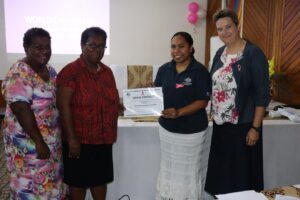

Group photo of all Health Officials, Government, NGOs and Business houses representatives.
Health & Partners commemorates World Cancer Day.
The Ministry of Health and Medical Services (MHMS), together with Health Supporting Partners, the World Health Organization (WHO), and the Australia High Commission office in the Solomon Islands, celebrated World Cancer Day on Friday, October 27, with the theme “Close the Care Gap” at the Honiara Hotel.
Ministry of Health and Medical Services National Cancer Project Nurse, Mrs. Jenny Gaiofa, highlighted that the World Cancer Day is a day to raise awareness on cancer as it is one of the disease burdens in the developing countries, of which Solomon Islands is included.
“Our government, partners, and all of us need to be aware of and strengthen actions towards improving access to quality care, which includes screening for early detection, early treatment, and palliative care”, said Mrs. Gaiofa.
She explained that the theme “Close the Care Gap” means that we need to be aware of inequalities in terms of access to cancer care services and take necessary actions to address them.
She also revealed that data has shown cervical and breast cancer are the most common cancers in Solomon Islands.
“The Cervical Cancer Program under the Reproductive, Maternal, Newborn, Child, and Adolescent Health Division will provide more public awareness on screening and early treatment of cervical and breast cancers in schools and in communities. The programme will also train nurses and midwives to have the skills and knowledge so that they can perform cancer screening tests to improve early diagnosis and treatment of confirmed cases”, said Mrs. Gaiofa.
She encouraged all the female participants at the event to take the necessary steps on ways to address and close the care gap in cervical cancer and breast cancer, the two leading cancers in our country affecting women today.
“Today marks Pinktober, the month for breast cancer awareness. Let us embrace the families of our sisters who have passed on, sisters who are currently sick, and salute our surviving sisters”, said Mrs. Gaiofa.
Joining the occasion, Mrs. Elise Newton, First Secretary Health, Australian High Commission said the disease over the past years has become a burden for Solomon Islands development as it affects young women in their most productive years (30–40 years). And unfortunately, women are often diagnosed late, when the cancer is already well advanced.
However, Mrs. Newton stated that much more can be done, including increasing awareness of symptoms, HPV vaccine for girls, and efforts to strengthen early detection and timely treatment.
“Australia is pleased to be contributing to this effort through the Solomon Islands-Australia partnership for health, building on our long standing support in this area, including assisting with the establishment of the Oncology Unit at the National Referral Hospital.
“The Australian High Commission health team is represented on the Ministry of Health Cervical Cancer Technical Working Group, which is driving reforms in this area. The Technical Working Group is also supported by WHO, UNICEF, GAVI, UNFPA, and IPPF/SIPPA.
“Australian non-government organizations Family Planning Australia and SurfAid are also long-standing and important contributors to the work of this group. This collaboration is getting results, including the development of the MHMS Cervical Cancer Policy Document”, said Mrs. Newton.
In addition, Australia supports Solomon Islands through the establishment of an Oncology Unit at NRH in 2019.
Meanwhile, World Health Organization (WHO) Country Representative, Dr. Howard Sobel, said that according to the WHO Global Cancer Observatory (GLOBOCAN, 2020), breast cancer is the most common cancer in women in the Solomon Islands, with approximately 122 new cases every year followed by cervical cancer, with approximately 65 new cases every year.
Therefore, Dr. Sobel said WHO has provided and continues to support the introduction of new technologies for better detection and treatment of cervical cancer. This includes molecular testing for early detection and thermal ablation treatment of pre-cancerous and early cervical cancer.
“It is important that every woman gets screened, even if they do not have symptoms. We are hoping that globally and nationally, every woman, family, and community will be aware that we can prevent and make cervical cancer a disease of the past”, said Dr. Sobel.

Ms. Zina Fefera, Health Senior Program Manager, Australia High Commission and Mrs. Elise Newton, First Secretary Health, Australia High Commission handed over a donation certificate of five thousand dollars to the Oncology Unit at NRH to Dr. Leanne Panisi, Head of Obstetric and Gynaecology, NRH and Mrs. Jenny Gaiofa, National Cancer Project Nurse, MHMS.

Guests seated at the event.
MHMS Press